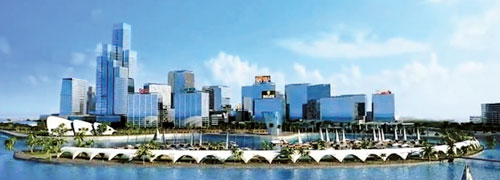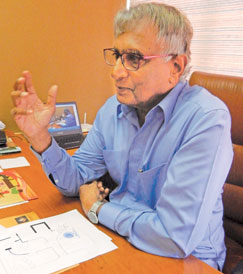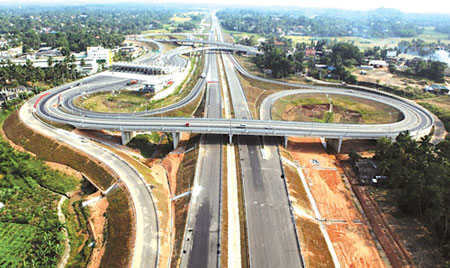We need Colombo Port City - Dr. Surath Wickramasinghe
by Ranil Wijayapala
President of the Chamber of Construction Industry in Sri Lanka Dr.
Surath Wickramasinghe says the Government should maintain the progress
the country achieved in the construction industry during the past few
years by expediting the process of reviewing the mega development
projects, as delays in the process will make a bad impact on the
construction industry.
 In an interview with the Sunday Observer Dr. Wickramasingha insists
the Government should keep the confidence of the foreign investors
without arbitrarily halting the ongoing projects as there are so many
foreign investors who are closely observing the situation here in Sri
Lanka to make their investments. He also says that a project like
Colombo Port City is needed for the country to attract investors, as
such projects can have the capacity to provide state-of-the-art
technology in a limited area. In an interview with the Sunday Observer Dr. Wickramasingha insists
the Government should keep the confidence of the foreign investors
without arbitrarily halting the ongoing projects as there are so many
foreign investors who are closely observing the situation here in Sri
Lanka to make their investments. He also says that a project like
Colombo Port City is needed for the country to attract investors, as
such projects can have the capacity to provide state-of-the-art
technology in a limited area.
However, he also emphasises that the Government should make it a
pre-requisite to get portions of such mega projects for the local
consultants and contractors for the local construction industry to
benefit from those projects.
Q: We saw a steady progress in the construction industry in
the country a few years after the end of the conflict. Do you think
there was a negative impact on the construction industry after the
change of government in January this year?
 A: Although there was very little happening in the
construction industry soon after the end of the internal conflict
because investments took time to come a few years later the construction
industry had steady progress with many development projects taking
place. Chinese are the people who came to our rescue and they gave us
loans. Nevertheless, they were the only people who actually helped Sri
Lanka at that time. That created a momentum for other investments like
Shangrila hotel, ITC Colombo and TATA project to come in. Colombo
beautification also came with the Ministry of Defence and Urban
Development. That helped to transform the country from a war situation
to a different perspective. As a result the construction industry
recorded a growth rate, according to the Central Bank, averaging about 7
to 8 percent. The construction sector growth was going around 20 and 23
percent. That was very healthy. That is what happened after the
conflict. A: Although there was very little happening in the
construction industry soon after the end of the internal conflict
because investments took time to come a few years later the construction
industry had steady progress with many development projects taking
place. Chinese are the people who came to our rescue and they gave us
loans. Nevertheless, they were the only people who actually helped Sri
Lanka at that time. That created a momentum for other investments like
Shangrila hotel, ITC Colombo and TATA project to come in. Colombo
beautification also came with the Ministry of Defence and Urban
Development. That helped to transform the country from a war situation
to a different perspective. As a result the construction industry
recorded a growth rate, according to the Central Bank, averaging about 7
to 8 percent. The construction sector growth was going around 20 and 23
percent. That was very healthy. That is what happened after the
conflict.
After this government came in, some of the projects have been going
on without any major problems, but at the same time the big projects
such as the Port City project is now on hold until the reviews are done.
Several other infrastructure project such as the water sector, UDA
housing projects as well as the Tri Forces headquarters project, are
going on but still the funding is not coming as required. This is the
unfortunate part of the exercise. We don't know whether the continuity
of the progress of the construction industry can be maintained with the
reviewing of the project. But if they are reviewing the project very
fast jobs can brought back on track.
Q: Do you think these reviews are essential at this moment?
A: According to the present Government, the projects are
overpriced. That may be true. They want to see whether that is actually
true or prices can be brought down. That is happening in several
projects. On the road projects like Outer Circular Highway, the
Government said the price of the contract was reduced by US $ 30
million. Unfortunately, the Northern Expressway which is very needed at
this time, is also being reviewed at present. These reviews are ok but
they should be done speedily. The Chamber of Construction Industry has
all the resources; quantity surveyors, architects and engineers in
different disciplines and we can easily help the Government to fast
track the review process but so far nobody from the Government has
reached us.
Q: The Colombo Port City project has come under severe
criticism by various segment of society and it has become political and
diplomatic issue in Sri Lanka now. Do you think it is an essential
project for the country?
A: I also had the feeling that we don't need this when so much
of land is available in the Colombo area, why should we go in to the new
development for the port city. I also studied the proposal by the former
UNP government where they also wanted to develop a land according to the
Singapore plan called CESMA. It also had a similar development in the
sea. Although I was against the Colombo Port City project, once I
studied it found that there is no major I problem of doing it because
some of the countries like Singapore and several Middle East countries
have filled the sea and created islands. According to hydrological
scientists this is safer to do due to the construction of the Colombo
South Harbour. The other fact is that the sole investment is coming from
foreign.
They are responsible to bring in foreign investment for the
construction of other buildings inside according to media reports. This
will be a huge boost for the country and for the people of Sri Lanka at
no cost. When you look at the project at that way we can't see any
danger in this.
Q: Was there any study to check whether the Port City project
is fitting to the future Colombo city development plan?
A: I think it is fitting to the Colombo city. I think there is
a new proposal to bring an expressway along the Colombo port, connecting
it to the other expressways we have.
 So that comes directly into this complex. Therefore, it won't
interfere with the movement of the traffic in other areas in Colombo.
That won't make it more difficult for us to get about because the
expressway will get the fast traffic out into the Airport Expressway and
Outer Circular Highway to the South and to the North. Don't forget the
fact that these people will come here and invest money if they don't
make on their own study. So that comes directly into this complex. Therefore, it won't
interfere with the movement of the traffic in other areas in Colombo.
That won't make it more difficult for us to get about because the
expressway will get the fast traffic out into the Airport Expressway and
Outer Circular Highway to the South and to the North. Don't forget the
fact that these people will come here and invest money if they don't
make on their own study.
Q: Should there be a study from our side to look after our
interests also. Do you think this has happened?
A: There should be study to look after our interests. There
should be financial benefit for Sri Lanka. There is definitely a benefit
from the project.
Q: Do you suggest any changes to the Port City project?
A: No detailed designs of the project has been done and that
will happen at the next stage of the project. Even the UDA has not seen
the drawings to see what they want to do. So it is very difficult to
comment on a thing that is not been done. Once it is done we can
comment. The construction industry is hoping that some of the contracts
will come to the locals. Otherwise there is no benefit to us from the
project.
Q: Without having any detailed planning of the project is it
correct to commence the reclaiming of the sea?
A: When the land is filled the sub structure work is
different. Therefore the piling and various other things will happen
after that. Therefore, that had no bearing on the piles and the weight
of the building. Piles will take the weight of the building. Therefore
there is no harm in developing the infrastructure part.
Q: Do you agree with the costing of the project?
A: Actually the costing of the project does not arise for the
Sri Lankan Government. Whether it's a 500 million dollars or whether it
is one billion dollars project that doesn't affect the Sri Lanka
government because it is not Sri Lanka government's money. It is a
foreign investment. That is what Sri Lanka needs and this is the biggest
project Sri Lanka has ever got.
Q: You have mentioned in a letter to the Government that
government should keep the confidence of the investors. Do you think
that we should risk our national interest, security issues and other
related issues to maintain the confidence of the investors towards us?
A: The business confidence is a different thing and national
concerns are different. I don't think that there is any danger in giving
500 acres land for a foreign investor because the countries such as
Australia and various other countries are also asking the Chinese to
come.
I can't see a physical danger that they can come and land submarines
in a small land area like this.
When you study the project I don't see any danger from this project.
The risk is whether the investors will come. Otherwise they will just
fill up the land and it will be another Galle Face Green.
What is important is that the government must make sure that the
Chinese company will get the investors that they have indicated.
That will be a smart city with the latest technology. Otherwise the
investors won't come. The other investors will not come if the latest
technology is not available here. In our part of the country we can
provide all those facilities. In a small area such as this we can
provide the latest technology.
But the business confidence is different. If you stop projects
arbitrarily then the investor will wonder what is happening, because the
investor has already commenced the project and you are stopping the
project for review like the Chinese project and so many other projects.
While you are reviewing the project let them continue. There are so
many other investors on the pipeline to come in. Therefore we must not
discourage them to come in. We must not stop projects.
Q: What is the impact on the construction industry due to this
reviewing process?
A: Lot of contractors who are members of our chamber have got
huge commitments not only to the banks but also to the employees. Since
their projects are stopped they have to answer. They have to retrench
the staff.
And if they retrench the staff the whole objective of maintaining a
growth rate in the construction industry and its move forward will
hampered.
Q: When we come to the expressway projects they are also
temporarily halted for reviews saying that they are overpriced. Do you
agree with these criticisms?
A: As I said earlier, I have not studied anything but our
chamber has the necessary resources to check whether these things are
above the market rate or at reasonable cost. But we do not know the
basis how they have costed those projects because that is the duty of
the government. But the way forward is to make sure that it is not
overpriced. In such an event it is good to review, but the review must
be fast.
Q: The city beautification projects initiated during the
previous regime was given much publicity. Do you thing those things
actually happened?
A: Actually it has really happened and it is also happening
because it is a World Bank funded project.
Therefore the World Bank will make sure that we will continue with
the original design and original plan with present government also.
Q: Is it necessary to have such projects in the long term
process of city development?
A: Definitely. Any investor coming to Sri Lanka today gets a
very nice and comfortable picture about the city. If our good roads and
pavements are good then the waterfronts are very evident; that is an
impetus for the foreign investors to come. If you identify the important
locations and give them necessary infrastructure, automatically the city
of Colombo will improve. We must continue with the same plan.
Q:There are criticisms over the Urban Regeneration Program
implemented by the UDA, that it has not been properly discussed before
implementation. Do you think this is good precedent?
A: The Urban Regeneration Plan is what the Colombo city
requires urgently. Fifty per cent of the city is full of underserved
building with shanties and warehousing and similar buildings occupying
prime lands in the Colombo city. The Slave Island property is also like
that. We were the first to start Panchikawatta triangle development. It
is an urban regeneration project but unfortunately not many people
understood what the urban regeneration is about. Even the UDA did not
understand it. As a result, awareness was not there.
The need to relocate people in good accommodation and liberate the
lands that are encumbered with slums and shanties and then transform the
area is urban regeneration. Slave island project is such project. Don't
ask me about the agreements and the procedures how they have adopted,
but I think it is an excellent proposal and that location is only 400 -
500 yards from the sea. If you liberate the prime land then you get
apartments coming in better quality is good. What I think UDA is trying
to do is to relocate the people. So that is the way forward. Without
relocating the people you can't take their lands.
Q: But do you agree with aribitrary implemention of
development projects?
A: They are not doing it arbitrarily. If you go and acquire
small parcels of lands and do this type of development that is bad. But
what the UDA has done is a comprehensive development like what we were
trying to do at Panchikawatta. But I am not agreeing with the fact that
you have high end apartment and the slums together. What we propose is
shift the slums to a different area and then develop the area on a
proper basis.
Q: The awarding of contracts for the development projects have
come under severe criticism. The unsolicited awarding of tenders for the
projects has had a bad impact on the construction industry. How has this
procedure affected the construction industry?
A: The procurement procedure in Sri Lanka is really
questionable. Normally what happens is they call somebody and give it to
them. There is no transparency in such a system. Therefore we have to
bring in transparency into this process. It is a very vital aspect we
have to address.
I think the Government is thinking of setting up a procurement
procedure. But I am not going to say it is going to be perfect. Again
they should consult people like us. We know how to implement a proper
procurement procedure. Then they can accept it or reject it. They can
talk to us. The problem is that they try to do everything themselves
without listening to the experts. If they make a procurement procedure
applicable to all the projects, it must be a workable thing so that we
won't jump into the problems we are having now.
Even if the projects are given on unsolicited basis, first they
should advertise it and then if there is nobody to take it, they can
give it to somebody, because everybody cannot do mega projects. They
should have financial and other resources to undertake those projects.
Only foreign firms have such resources. The other contractors should
also be given an opportunity to bid for the tenders. We must have a very
pragmatic policy. But at the same time there must be disciplines and
procedures and it should be transparent and everybody must have the
opportunity to participate.
Q: Sri Lanka mostly depends on national agencies for funding
for development projects. In most of the cases conditions are laid down
that the contracts should go to donor countries. Do you think this is a
favorable situation for the local construction industry?
A: I think most national funding agencies like JICA and USAID
have their own protocol. They have a basis for awarding.
When we ask them why they bring foreign consultancy and contractors
when these projects can be done locally, they say is the blame should go
to our financial organizations who are visiting those countries to sign
these documents. |

